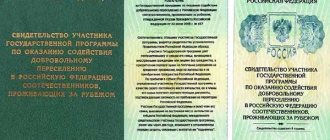The material was prepared by order of the law firm DobroPravo
Who is considered a dependent? How to write an application to establish the fact of being a dependent? Why do you need to be recognized as a dependent of a citizen?
This article is a short overview guide to issues related to establishing a legal fact - recognition as a dependent.
A dependent is a citizen whose main source of livelihood is the financial support of other people (the “dependency” itself is defined accordingly).
Dependents include:
- minor children;
- elderly persons whose pension is insufficient or does not cover the minimum subsistence level.
Disabled people, most often having a disability group.
Dependents may include not only family members, but also other persons.
The fact of being a dependent does not in itself require official registration, which creates the need for its special establishment.
Important: able-bodied unemployed citizens cannot be recognized as dependents.
Who is a dependent in simple words
A dependent (from the English “dependent”) is a person who is forced to be on the financial support of another person for a long period. This is due to the fact that due to his disability, the dependent does not have the opportunity to earn money on his own.
In most cases, when there are no legal proceedings involved, being a dependent does not provide any benefit to the person's relatives or the dependent himself. There are only a few situations that will require confirmation of a citizen's dependent status.
This concept can be interpreted in several ways. In general terms, a dependent is a person who is provided for a long period or temporarily by another individual or the state.
If a citizen receives support and lives at the expense of another private person or government agencies, he is dependent.
The concept itself comes from the word “wait,” which means to live or waste. Later, the word received a clearer interpretation and was applied to people who needed financial help from others. At the moment, in Russian legislation there are quite a large number of situations that are the basis for relying on outside help.
Therefore, a clearer definition of the main characteristics of a dependent was required. Some believe that a dependent is practically the same as a disabled person, but this is not always true, since dependents can be people without any physical disabilities. For example, we can talk about children under a certain age.
Who are dependents: the position of legislators
There are several interpretations of the concept of what a dependent is. If we turn to the general semantic load, dependents are citizens who are temporarily or long-term supported by another individual or dependent on state assistance. If a person receives support, lives at the expense of other bodies or private individuals, this means that he is dependent.
The word is of Old Church Slavonic origin, from “expect”, which meant to waste or live. Later, the word received a clearer form to identify individuals who need financial support at the expense of others. A person who needs additional support at the expense of others is called a dependent.
Since the law contains many cases when a person in need has the right to count on outside help, a more precise disclosure of the characteristics of dependency and rights within this status was required.
The concept has not been clearly defined in the Civil Code, but there are a number of general provisions in federal legislation that mention the rights and conditions for dependency.
According to the provisions of Federal Law 173, adopted on December 17, 2001, when clarifying issues regarding labor pensions, legislators defined the categories of persons who may be dependent (Article 9, paragraph 2). The law exempts from the need to obtain a special status for minors who are supported by capable adults. The remaining categories of citizens confirm their status within the framework of labor legislation on the basis of a medical certificate of incapacity received.
Turning to labor legislation, namely Art. 179 of the Labor Code of the Russian Federation, find provisions that clarify the signs of compliance with the status of “dependent”. For a working person, dependents are considered to be all persons who are fully supported, receive money and the conditions necessary to maintain decent living conditions.
Who can be considered a dependent
Obviously, the interpretation of the term can vary significantly in relation to different legal areas. Common definitions include words about dependents as persons who are unable to provide for themselves and are forced to rely on the help of others.
From this formulation it follows that health status and disability are only one of the reasons to consider a person dependent.
Categories of citizens who are considered dependents:
- persons with registered disabilities, including those unable to work due to mental disorders;
- minor relatives;
- persons over 18 years of age who are in full-time education without the opportunity to earn money;
- pensioners recognized as disabled;
- persons who signed an agreement with the appointment of lifelong maintenance.
- How to recognize the incapacity of an elderly person
There are persons supported by the state and private persons. State support is provided for children left without parents, pensioners, students and disabled clients of specialized government institutions.
More often, dependency is encountered within one family, when citizens themselves are obliged to provide their loved ones with the necessary degree of comfort:
- Minor children, including adopted children.
- Persons with disabilities living in the family, regardless of age.
- Children of parents, subject to their disability, minority or full-time education, under the age of 23 years.
- Parents receiving monthly contributions from the Pension Fund.
- Children of children under 18 years of age.
- Marriage partner after retirement.
- Persons who are dependent for life according to a previously signed agreement.
Some are accustomed to calling a woman raising young children a dependent. It is possible to obtain this status, but only if the mother is not on maternity leave and does not work due to the need to take care of children under 14 years of age.
Who is considered a dependent?
Depending on the legal area, the concept of “dependent” may differ. If we combine all the interpretations into one, a dependent is a person who cannot constantly or for a certain amount of time provide for himself independently, and therefore needs the help of relatives, other persons or the state.
In this regard, disability or unsatisfactory current state of health can be considered only one of the grounds for assigning dependent status. There are 5 categories of citizens who can be classified as dependents:
- Citizens with a disability group, including those disabled people with mental disorders;
- Relatives who have not reached the age of majority;
- Adult students who are in full-time education and therefore do not have the opportunity to earn money on their own;
- People who have been assigned lifelong maintenance based on a contract;
- Pensioners, but only if declared incapacitated.
Dependents are also divided into two more categories. These are the people who are supported by private individuals and government agencies. The second option is provided for minor children who are left without parents, as well as clients of specialized government institutions recognized as disabled, students and pensioners.
In most cases, the dependent is supported by his family. In this case, the following persons may be kept:
- Adopted children, including their own adults;
- Persons who are dependent for life according to the signed agreement;
- Citizens who have a degree of disability and live in a family. Age does not matter in this case;
- Children under 18 years of age;
- Disabled wife or husband in case of retirement;
- Children recognized as disabled or studying full-time (only up to 23 years old).
Popularly, a woman who is raising several small children is sometimes called a dependent. She can indeed apply to government agencies to obtain such status. But this is only possible if the mother is not currently on maternity leave and cannot go to work, since she needs to take care of children under 14 years of age.
If a dependent is left without the person who provided for him, he will be assigned a monthly allowance based on a court decision. The amount of such benefit is calculated using a special formula that will take into account the current situation of the dependent.
The concept of “dependent”, types of dependency
Having ancient Slavic roots, the word was previously interpreted as “to live”, “to spend”. Over the centuries, it began to experience transformation into a special concept, which actually means supplying a person in need. The term is used in many legislative acts and practical matters. However, it will not be possible to find a definition as such in any law.
Information!
A citizen deprived of the ability to independently obtain food, clothing and other benefits without outside help is protected by law. In the Russian Federation, a dependent receives support from the budget or from the earnings of another able-bodied citizen. Dependents do not include unemployed citizens who are able to work and do not have physical limitations.
There are several categories of citizens who, according to domestic legislation, are entitled to this status:
- disabled people (those with physical injuries or mutilations);
- disabled as a result of diagnosis of mental illness;
- minor citizens;
- full-time students;
- pensioners;
- those who agreed to live for life at someone else’s expense under a maintenance agreement.
Those in need of provision of necessary goods are divided into 2 large groups: dependents of the state and individual individuals. The first group includes the following individuals:
- pensioners;
- orphans;
- state-supported students;
- disabled citizens who, due to their special status, are in special institutions with full support.
Many able-bodied people have relatives under their guardianship, and their number is not legally limited in any way. Wards of an ordinary citizen:
- children under 18 years of age, natural or legally adopted;
- a relative with a disability without age restrictions;
- disabled sisters and brothers;
- grandchildren under 18 years of age;
- elderly parents who have retired;
- retired spouse;
- children and grandchildren, sisters and brothers under the age of 23 while studying full-time at a university;
- citizens who have signed a lifelong maintenance agreement with dependents.
Information!
To the question of a mother raising a young child: how long can she have dependent status? Maternity leave paid by the company automatically removes her from this category. And she is allowed by law to be supported until the fourteenth birthday of her youngest son or daughter.
Why do you need dependent status?
Often, people do not apply to government agencies to obtain dependent status unless they have a legal right to any benefits or demonstrate financial obligations to other citizens. The only category of citizens who will not have to confirm their status are minor children, since they are such initially based on generally accepted norms of law.
Speaking of other citizens, they should use the procedure for establishing dependent status and contact government authorities.
Dependent status may be needed in the following cases:
- The citizen wants to get priority and thus retain his job. In this case, the employer will not have the opportunity to fire the person, since he employs disabled or minor persons;
- After receiving the status of a dependent, at the time of the inheritance transfer procedure, a person will be able to claim property on an equal basis with the heirs of the first priority, regardless of who exactly the testator was a dependent;
- A person intends to achieve a reduction in criminal or administrative punishment. This means that if a citizen who has committed a crime maintains disabled persons, his sentence may be commuted;
- If necessary, fill out paperwork to receive benefits from the state in the event of the death of the person who provided for the dependent. We are talking about one-time payments and benefits for the loss of a breadwinner;
- The need to re-register documents if the breadwinner was deprived of liberty due to a criminal offense.
To calculate benefits and benefits, a citizen claiming dependent status or his future breadwinner must go to court at his registration address and prepare a statement of claim. It is on the basis of a court ruling that has entered into force that it can be used as a basis for confirming rights to priorities and certain benefits. They can be applied both to the dependent and to the breadwinner himself.
Legislation mentioning dependents
No laws actually regulate the rights of dependents or give them a full, detailed definition. However, the term appears frequently in many major legal documents:
- Civil Code of the Russian Federation - one of the articles discusses the possibility of them inheriting the property of the deceased breadwinner. The right to a share in the inheritance arises for the dependent after one year of guardianship. Even if the citizen providing it did not include it in his will, the state legalized a mandatory share for the dependent. The adopted child becomes a potential heir, as do blood relatives. There is also an article in the Civil Code that fully describes the procedure for judicial determination of dependency.
- Labor Code - this indicates the advantage of the breadwinner compared to other employees in the enterprise. When faced with dismissal, he has the right to retain his place in front of the employee without dependents depending on him. One of the articles of the Labor Code of the Russian Federation states that a relative whose ability to work is limited or impossible is considered a dependent person. The income of the breadwinner is the only source of food and existence for the ward.
- The Family Code - it does not provide a detailed explanation and does not interpret the concept for further operation with it, at the same time, the possibilities and obligations of other relatives who are in a more favorable position in relation to them are delineated: provision of children by parents, financial support of one spouse for another at loss of one of them's ability to work. It is also stipulated here that orphans, for obvious reasons, become dependents of the state.
Until what age is a child a dependent?
This issue should be considered separately, since there are a number of exceptions in legislative acts. The age up to which dependency can be determined depends on whether the disability or incapacity of minor children is established. For example, upon emancipation, a teenager will be deprived of a breadwinner, since this status will be lost automatically.
Also, the child will leave custody before his 18th birthday if he gets a job or registers a marriage. In this case, the dependent status is lost, and this fact is confirmed by a court decision that the minor citizen is recognized as emancipated. It is also worth knowing about cases where the dependent period can be extended to 23 years. We are talking about the following situations:
- The dependent has received a disability group and, accordingly, the status of disabled person;
- The person will be in full-time study at any educational institution, which will not give him the opportunity to find a job and provide for himself. But this is only possible until the student turns 23 years old.
A daughter or son is recognized as disabled regardless of their life situation and is dependent on their parents according to the law. While children are minors, they do not have to confirm the presence of this status. State authorities, if necessary, may request an extract from the house register or a certificate of family composition.
Procedure for assigning dependent status
To obtain dependent status, you must apply to the court at the applicant’s place of residence. A sample application form can be found on the official website of the judicial institution. The procedure for recognizing a citizen as a dependent occurs in stages:
- Confirming that one person is truly dependent on the other, as well as collecting the necessary documents.
- Compiling and submitting an application.
- Consideration of the petition in court.
- Announcement of results.
When making an application, you must prepare the following information:
- Full name, residential address and date of birth of the applicant;
- Court address and name;
- Information about interested parties;
- If we are talking about establishing the fact of being supported by a deceased person, the application should indicate potential applicants for the inheritance;
- It is necessary to briefly state the circumstances that reflect the dependent status of the plaintiff. Here it is also necessary to enter data about citizens who can confirm this information;
- By law, the applicant is obliged to indicate the purposes for which the received status will be used. This may be the need to receive an inheritance on an equal basis with first-degree relatives, receiving benefits after the loss of a breadwinner, any benefits and other goals. In each of these cases, different rules of substantive law apply, which will ultimately affect the court's decision;
- If necessary, the applicant must indicate in the application a request to suspend the inheritance process. Here you can rely on the existence of a dispute regarding inherited property;
- The requirement to recognize the applicant as a dependent of another person and indicate his full name;
- List of collected documents.









